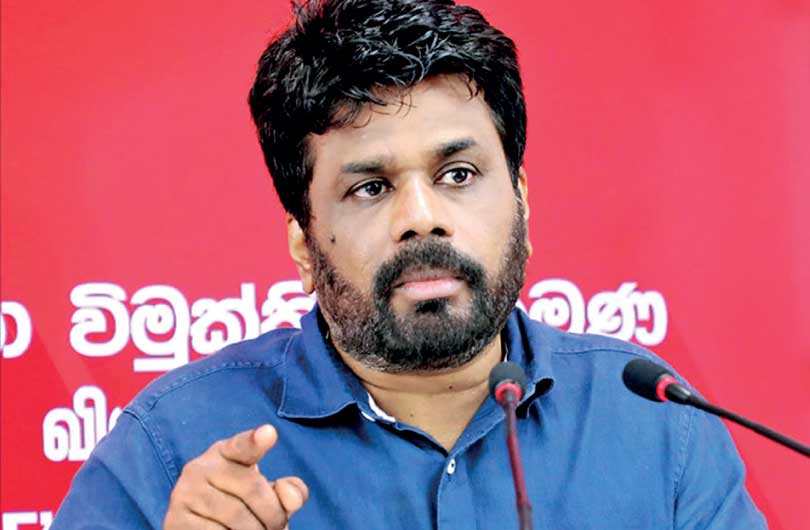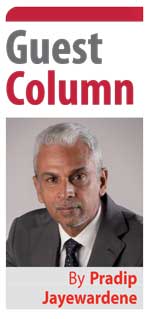Saturday Feb 14, 2026
Saturday Feb 14, 2026
Tuesday, 10 September 2024 01:22 - - {{hitsCtrl.values.hits}}

Why does the NPP want to change the entire system of government and our economic structure?
 Have no illusion about what the NPP intends to do. They plan to change the economic and governance structure of Sri Lanka which has stood for 76 years, on the guise of eliminating corruption and creating a better society. They will establish an autocratic government in the hands of a few with no accountability or public scrutiny. Our ancient culture and religions will be at risk, jeopardising the very fabric of our society Have no illusion about what the NPP intends to do. They plan to change the economic and governance structure of Sri Lanka which has stood for 76 years, on the guise of eliminating corruption and creating a better society. They will establish an autocratic government in the hands of a few with no accountability or public scrutiny. Our ancient culture and religions will be at risk, jeopardising the very fabric of our society |
 J.R. Jayewardene in a landmark lecture at the University of Colombo in 1950, describes the philosophy of Karl Marx. “That the economic state of a given society is the fundamental principle or form of its life and all other phases of its civilisation, religion, aesthetics, etc., were only variable dependent functions.”
J.R. Jayewardene in a landmark lecture at the University of Colombo in 1950, describes the philosophy of Karl Marx. “That the economic state of a given society is the fundamental principle or form of its life and all other phases of its civilisation, religion, aesthetics, etc., were only variable dependent functions.”
J.R. contrasts Marx’s philosophy with that of the Buddha, “Happiness to his way of thinking comes not from outside, from a hostile world but from within. Suffering (Dukka) is man’s own creation. It is not a quality of the external, nor is it the effect of the external world upon oneself. Man can, therefore, eliminate suffering by his own efforts.”
“Marx on the other hand, emphasises the economic structure that surrounds man. Change the structure he says, and man automatically changes. His disciples, therefore, are not interested in changing the nature or the mind of man. The morality of human existence is of no concern to them. Ethical conduct is despised, the means that are used to achieve the end, which is the change of the economic structure, is immaterial. Since the goal is not an ethical goal, even violence is justified and considered to be the only method of changing society.”
Marx’s goal was to change the evils of the society at the time he was living, which he saw as capitalism and its result, profit, and the exploitation of workers, women and children. His ideology led to the destruction of many great nations and to the loss of countless lives.
Capitalism is the dominant economic system of the world today and even the die hard Marxist/communist states have embraced capitalism simply because it is the only system that works.
An ideological battlefield
We live in an ideological battlefield today, running up to a hard-fought Presidential election on 21 September. One organisation stands out, the National People’s Power (NPP), raising a cry for the elimination of corruption and a change of the entire system to achieve this.
Their battle cries are “all 225 members of parliament are corrupt”. “We have had 76 years of misrule”, etc. They propagate anger by equating the economic woes of our population to the corruption of our leaders, but this is only a half truth, corruption is certainly one of our more serious problems, but so is State control of vital parts of our economy, mismanagement, lack of planning and lack of competitiveness in today’s global economy and the many external events which we had no control over. Economic systems fail from time to time even in the world’s great economies and leaders must be constantly on watch to make changes when required. We were negligent, lulled into complacency, thanks to our four decades of nearly continuous economic growth.
The NPP is asking for a mandate to end corruption and build a better society. To achieve this, they propose to change the constitution, the structure of government and our economic system.
It is a lie that corruption can be eliminated completely. Just as murder, stealing, lying, adultery or the use of alcohol and drugs can never be eliminated from society, corruption which is stealing from the State can never be eliminated. It can however be severely curbed by making officials accountable, bringing perpetrators to justice, tracing and recovering stolen property, eliminating procedures and rules that encourage corruption, by improving transparency and digitisation.
Many countries have achieved very low levels of corruption by adopting these processes.
Then why does the NPP want to change the entire system of government and our economic structure?
The NPP manifesto states that they would introduce a new constitution and establish a parliamentary system of government. They would also abolish the Executive Presidency and create a non-executive President.
They also propose to change the parliamentary electoral system and introduce a scheme where non-performing or corrupt members of parliament are recalled. They will also appoint advisory committees of specialists to each ministry.
On the surface
These proposals on the surface look positive and seem to be means of creating a more democratic and equitable system of government, however in reality they could do just the opposite.
In our current Executive Presidential system, the President is voted in by 50% plus one of the population. Even in a three-cornered fight, the winning contestant may obtain around 40% of the vote. If this system is replaced by an executive prime minister who commands 50% of the MP’s in parliament who in turn obtain 50% of people’s votes (in a first past the post system), the actual representation of such an executive prime minister is only 25%. Half that of a directly elected Executive President. This could be even less in a proportional representation system. Moving to a non-executive presidency and an executive Prime Minister then reduces direct representation and is therefore less democratic.
The proposal to recall non-performing and corrupt MPs is alarming, who decides this? Is it the unelected central committee of the NPP? Does this not put all MPs under the control of an unelected group, subverting democracy and the rights of the voter to elect MPs?
The NPP proposes the setting up of specialist advisory committees within each ministry. What power will they have? Who will they report to? What happens to ministry officials if they do not heed the advice given? Is this not a means to remove the authority of ministry officials and centralise it in the hands of another power centre?
It is clear from the NPP official policy statement and the many utterances of various NPP members, that the intention is to completely change the governance structure of the nation and to replace it with a more autocratic system of government, controlled by a few individuals, hidden from public scrutiny or accountability. The visible system of government will simply be a front for the world to see, real power will be in the hands of puppet masters behind the screen.
Is this the system change we want?
Such an autocratic government, with power in the hands of a few individuals, not accountable to the public, will lead to abuse, corruption and victimisation on a scale that we have never witnessed in this country. Such an autocratic system will also be difficult to reverse as the real holders of power are unelected, not subject to a vote or public scrutiny and will subvert all elections to retain their power as we have seen again and again in many countries with autocratic governments.
J.R. said in his speech that; “The religion of Marxism seeks to capture Sri Lanka. Though its followers have split into several sects and sub sects such as Stalinists, Trotskyites and other growths from the parent tree, they all profess the same enmity to the teachings of the Buddha as well as to other teachers. Let us therefore have no illusion about the challenge of Marxism to the religions we seek in our humble way to follow.”
Have no illusion about what the NPP intends to do. They plan to change the economic and governance structure of Sri Lanka which has stood for 76 years, on the guise of eliminating corruption and creating a better society. They will establish an autocratic government in the hands of a few with no accountability or public scrutiny. Our ancient culture and religions will be at risk, jeopardising the very fabric of our society.
Will they give us a “beautiful life”? (“Lassana Jeevithayak” NPP policy document)
(The writer is a pioneer solar energy entrepreneur, former member of the Colombo Municipal Council, former Sri Lanka Consul General to Germany, and grandson of President J.R. Jayewardene.)